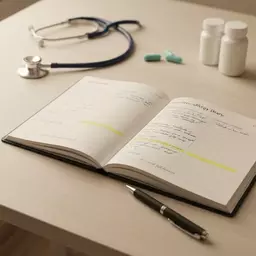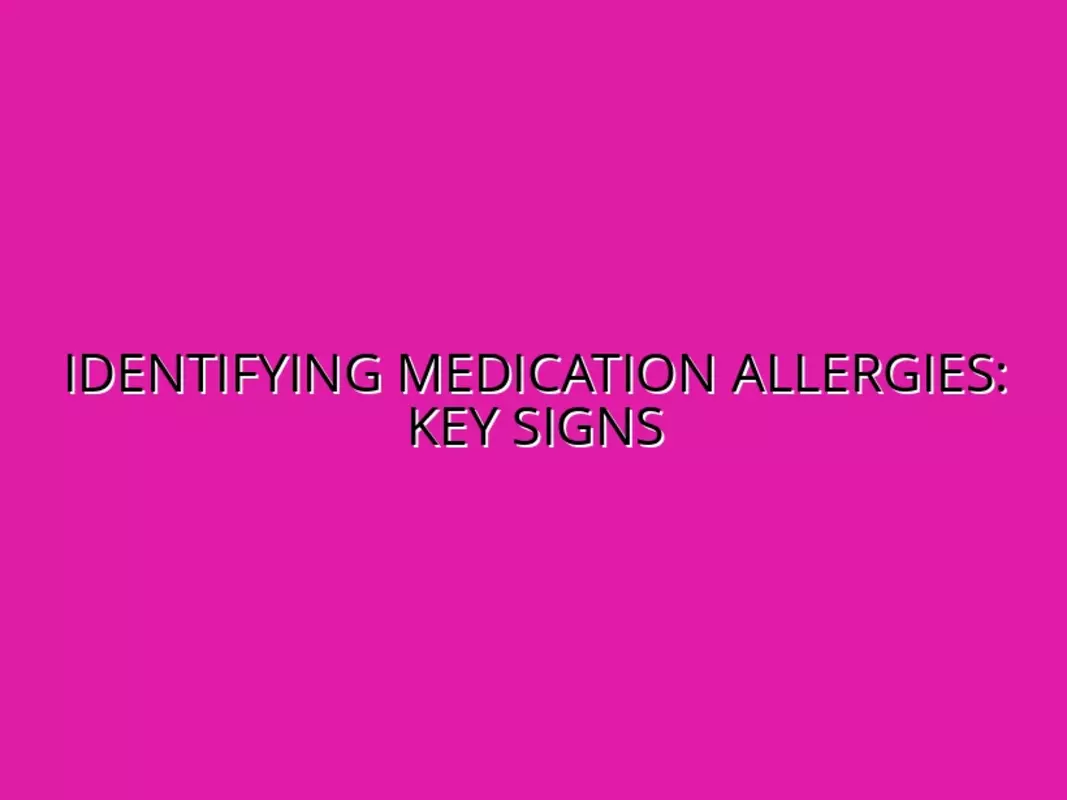Medication Allergies: Causes and Symptoms

Research indicates that nearly 10% of the population experiences adverse drug reactions, yet many confuse medication allergies with side effects. Understanding these differences can significantly impact your health choices.
What You Will Learn
- Medication allergies occur when the immune system wrongly identifies a medication as harmful, leading to a variety of symptoms.
- It is critical to distinguish between drug allergies, side effects, and drug intolerances to manage your health effectively.
- Communicating openly with your healthcare provider about your allergy history can lead to safer medication choices.
- Proactive management of medication allergies involves preparation, documentation, and ongoing education about your rights as a patient.
Understanding the Differences: Drug Allergies vs. Other Reactions
Differentiating between true immune-mediated drug allergies and other adverse reactions like side effects or intolerances is crucial for effective health management. This visual clarifies the distinctions.
Drug Allergies
- ✓ Involves antibody production
- ✓ Symptoms: Hives, swelling, anaphylaxis
- ✓ Can be life-threatening
Side Effects & Intolerance
- ✓ Predictable effects (nausea, drowsiness)
- ✓ Intolerance: Headaches, stomach upset
- ✓ Rarely life-threatening
Defining Medication Allergies: Understanding the Basics
Medication allergies can be daunting, especially for those of us navigating life with allergies. At I’m Allergic, we aim to break down the complexities surrounding these allergies and equip you with the knowledge you need. Let's start by understanding what a medication allergy truly is.
What is a Medication Allergy?
A medication allergy occurs when your immune system mistakenly identifies a medication as a harmful substance. This triggers a response, which can lead to various symptoms. It’s important to note that medication allergies can develop at any time, even if you've taken a drug without issue in the past. The Cleveland Clinic provides comprehensive information on medication allergies, highlighting that they are an immune system overreaction to a drug.
- Type of immune response: The body produces antibodies to fight the perceived threat.
- Symptoms: Reactions can range from mild to severe, often requiring immediate attention.
- Persistent education: Understanding your allergies empowers you to make safer choices.
By knowing the signs of a medication allergy, you can seek help quickly if needed. Remember, allergic reactions can sometimes escalate to serious levels!

Differentiating Between Drug Allergies and Other Adverse Reactions
It’s easy to confuse drug allergies with other adverse reactions that might occur when taking medications. Drug allergies specifically involve an immune response, while other reactions could be side effects or intolerances. The Mayo Clinic further elaborates on the symptoms and causes of drug allergies, distinguishing them from common drug side effects.
- Drug Allergies: Immune response resulting in hives, swelling, or anaphylaxis.
- Side Effects: Expected reactions that can happen with any medication, such as nausea or drowsiness.
- Drug Intolerance: An inability to tolerate a medication without an immune response, leading to discomfort.
Understanding these distinctions is crucial for effective management of your health. If you’re unsure about your experiences with medications, don’t hesitate to consult a healthcare professional!
Understanding Drug Intolerance: A Related Concern
Drug intolerance is another important aspect to consider on your allergy journey. Unlike allergies, which involve the immune system, intolerance occurs when your body reacts poorly to a medication without involving an immune response.
- Symptoms of Intolerance: These may include headaches, stomach upset, or fatigue.
- Commonly associated with: Medications like aspirin and certain antibiotics.
- Management: Adjusting dosages or switching medications can often alleviate these symptoms.
It’s essential to communicate openly with your doctor about any reactions you experience when taking medications. This will help you find the right treatment options while keeping you safe and informed!
The Underlying Causes of Drug Allergies
Now that we’ve established what medication allergies are, let’s dive deeper into the underlying causes. Understanding these can help you recognize potential risks and manage your allergies effectively. The American Academy of Allergy, Asthma & Immunology offers valuable insights into medications and drug allergic reactions, explaining how they occur.
We Want to Hear From You!
Have you ever experienced a medication allergy or intolerance? Understanding your personal journey can help others in the community. Share your experiences and tips below:
Frequently Asked Questions About Medication Allergies
Here are some common questions to help clarify key aspects of medication allergies and related reactions:
- Q: What is the main difference between a medication allergy and a side effect?
- A: A medication allergy involves an immune system response where the body mistakenly identifies a drug as harmful, leading to symptoms like hives or anaphylaxis. A side effect is a common, predictable reaction to a medication that does not involve the immune system, such as nausea or drowsiness.
- Q: Can a medication allergy develop even if I’ve taken the drug before without issues?
- A: Yes, medication allergies can develop at any time. Your immune system might become sensitized to a drug after initial exposures, leading to an allergic reaction on subsequent uses.
- Q: What are the typical symptoms of a drug allergy?
- A: Symptoms can range from mild skin reactions like hives, rash, or itching, to more severe responses such as swelling (angioedema), difficulty breathing, dizziness, and anaphylaxis, which is a life-threatening reaction.
- Q: How does drug intolerance differ from a drug allergy?
- A: Drug intolerance is a non-immune reaction to a medication, often due to how the body processes the drug or an increased sensitivity. Symptoms like headaches, stomach upset, or fatigue are common, and they are usually less severe than allergic reactions and not life-threatening.
- Q: What should I do if I suspect I have a medication allergy?
- A: If you suspect a medication allergy, stop taking the medication and seek immediate medical attention, especially if symptoms are severe. Always inform your healthcare provider about any past adverse reactions to medications.
Summarizing the Importance of Understanding Medication Allergies
Understanding medication allergies is crucial for anyone navigating the complexities of health and wellness. At I’m Allergic, we believe that being informed equips individuals to make safer choices regarding their health. Medication allergies can range from mild reactions to severe consequences, so recognizing the signs and symptoms is a vital step in taking charge of your well-being.
Consulting with healthcare providers about your allergy history not only aids in proper diagnosis but also ensures that you receive the best possible care. It’s important to advocate for yourself when discussing medication options, as your insights about past reactions can lead to safer prescriptions.
Taking Charge of Your Health: Consulting Healthcare Providers
Being proactive in your healthcare journey is key! Here are some steps I recommend when consulting with your healthcare provider:
- Be Honest: Share your full history of allergies and any reactions you've experienced.
- Ask Questions: Don’t hesitate to inquire about the medications being prescribed.
- Request Alternatives: If a medication isn’t safe for you, ask for alternatives.
- Document Everything: Keep a record of your medications and any reactions you have.
By taking these steps, you empower yourself to make informed decisions and improve your health outcomes. Remember, your healthcare provider is there to help, but your active participation makes a significant difference!

Encouraging Proactive Management of Medication Allergies
Proactive management is about more than just avoiding allergens; it’s about understanding your medication use and ensuring it’s safe for you. At I’m Allergic, we want to support you in every aspect of your allergy management journey.
Next Steps: Engaging with Healthcare Professionals for Safe Medication Use
Engagement with healthcare professionals will help you navigate your medication allergies effectively. Here are some tips for maximizing your healthcare visits:
- Prepare Ahead: Bring a list of all medications you currently take, including over-the-counter drugs.
- Discuss Your Allergies: Be clear about your medication allergies and any previous adverse reactions.
- Follow Up: After starting a new medication, schedule a follow-up visit to report any side effects.
Taking these actions ensures that you remain at the center of your health decisions and receive personalized care tailored to your needs.
Patient Education: Understanding Your Rights and Safety Measures
As a patient, you have a right to feel safe with your medication choices. Educating yourself about medication allergies not only protects you but also empowers you to advocate for your health. Here’s how you can educate yourself:
- Research Your Allergies: Look up reliable sources, like I’m Allergic, to learn more about your specific allergens.
- Know Your Rights: Understand your rights as a patient regarding informed consent and medication safety.
- Join Support Groups: Engage with communities that focus on allergy awareness for shared experiences and tips.
By taking charge and educating yourself, you’re not just protecting your health; you’re also paving the way for a safer and more informed experience when dealing with medications.
Recap of Key Points
Here is a quick recap of the important points discussed in the article:
- A medication allergy is an immune response to a medication that can develop at any time.
- Distinguishing between drug allergies, side effects, and drug intolerance is crucial for effective health management.
- Communicating openly with healthcare providers about your allergy history ensures better care and safer medication options.
- Proactive management includes maintaining a list of medications and discussing any reactions with your doctor.
- Patient education is key; know your rights regarding medication safety and seek support from communities focused on allergy awareness.






